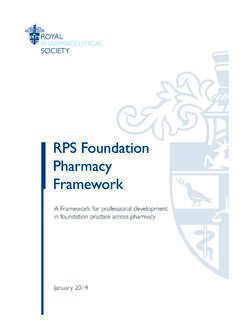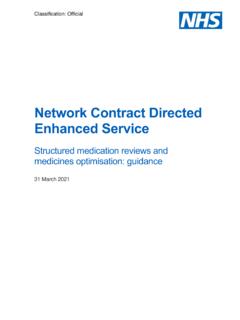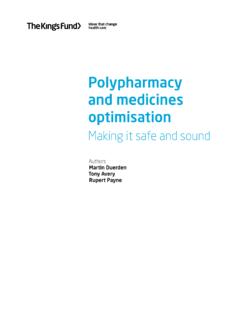Transcription of Medicines Optimisation - Royal Pharmaceutical Society
1 Medicines Optimisation : Helping patients to make the most of medicinesGood practice guidance for healthcare professionals in EnglandMay 2013 Endorsed byForeword The NHS Constitution establishes the principles and values of the NHS in England. It sets out rights to which patients, public and staff are entitled, and pledges which the NHS is committed to achieve, together with responsibilities, which the public, patients and staff owe to one another to ensure that the NHS operates fairly and effectively. Set in this context, the evidence base, which clearly demonstrates there is much to be done to help patients, public and Society more broadly get best outcomes from Medicines , is concerning.
2 From patients receiving insufficient information about their Medicines to too many hospital admissions caused by the adverse effects of Medicines which could have been prevented, professionals and patients need to work much closer together to improve the quality of Medicines use. This important document represents a collaboration between patients and the health professionals that care for them. It sets out four simple but important principles of Medicines Optimisation that could revolutionise Medicines use and outcomes: aim to understand the patient s experience, evidence based choice of Medicines , ensure Medicines use is as safe as possible, make Medicines Optimisation part of routine practice.
3 We would encourage everyone to adopt these principles whether prescribing, dispensing, administering or taking Medicines . Given that Medicines remain the most common therapeutic intervention in healthcare, and colleagues in research and the broad Pharmaceutical industry have worked hard to discover and develop safe and effective Medicines , we must all work even harder together to ensure that individual patients and Society gets as much value out of that effort as possible, and resources are used wisely and effectively. Sir Bruce Keogh National Medical Director NHS England Jane CummingsChief Nursing Officer EnglandDr Keith Ridge Chief Pharmaceutical Officer Medicines Optimisation : Helping patients to make the most of Medicines Introduction Medicines play a crucial role in maintaining health, preventing illness, managing chronic conditions and curing disease.
4 In an era of significant economic, demographic and technological challenge it is crucial that patients get the best quality outcomes from Medicines . However, there is a growing body of evidence that shows us that there is an urgent need to get the fundamentals of Medicines use right*. Medicines use today is too often sub-optimal (see box 1) and we need a step change in the way that all healthcare professionals support patients to get the best possible outcomes from their Medicines . Medicines Optimisation represents that step change. It is a patient-focused approach to getting the best from investment in and use of Medicines that requires a holistic approach, an enhanced level of patient centred professionalism, and partnership between clinical professionals and a patient.
5 Medicines Optimisation is about ensuring that the right patients get the right choice of medicine , at the right time. By focusing on patients and their experiences, the goal is to help patients to: improve their outcomes; take their Medicines correctly; avoid taking unnecessary Medicines ; reduce wastage of Medicines ; and improve Medicines safety. Ultimately Medicines Optimisation can help encourage patients to take ownership of their treatment. However, the Medicines Optimisation approach will require multidisciplinary team working to an extent that has not been seen previously. Healthcare professionals will need to work together to individualise care, monitor outcomes more carefully, review Medicines more frequently and support patients when needed.
6 The Pharmaceutical industry also has a key role to play in Medicines Optimisation through transparent and value for money partnerships with the NHS that help secure better outcomes for patients. Medicines Optimisation differs from Medicines management in a number of ways but most importantly it focuses on outcomes and patients rather than process and systems. This focus on improved outcomes for patients is likely to help ensure that patients and the NHS get better value from the investment in Medicines . Medicines Optimisation looks at how patients use Medicines over time. It may involve stopping some Medicines as well as starting others, and considers opportunities for lifestyle changes and nonmedical therapies to reduce the need for Medicines .
7 By improving safety, adherence to treatment and reducing waste the Medicines Optimisation approach will help to ensure that by working together we support patients to get the best outcomes from their Medicines . *a summary of evidence that shows the extent of the problem with Medicines use and examples of Medicines Optimisation interventions can be found on the Royal Pharmaceutical Society (RPS) website. ( ). Medicines Optimisation : Helping patients to make the most of Medicines Purpose of this guidance This good practice guidance provides four guiding principles for Medicines Optimisation that will help all healthcare professionals to support patients to get the best outcomes from their Medicines use.
8 The principles describe how healthcare professionals can enable patients to improve their quality of life and outcomes from Medicines use by having a sustained focus on the need to optimise patients Medicines . There is increasing recognition that finding out whether and how patients take their medication is part of our jobs as health care professionals. Suzanna Jacks, General Practitioner, Chepstow The guidance has been developed with input from healthcare professionals, patients, patient groups, lay representatives and the Pharmaceutical industry. The people involved and the guidance development process can be found on the RPS website. Box 1: Are we really making the most of Medicines ?
9 Do patients take their Medicines ? Only 16% of patients who are prescribed a new medicine take it as prescribed, experience no problems and receive as much information as they need (1). Ten days after starting a medicine , almost a third of patients are already non-adherent of these 55% don t realise they are not taking their Medicines correctly, whilst 45% are intentionally non-adherent (1). How well do we use Medicines ? A study conducted in care homes found that over two thirds of residents were exposed to one or more medication errors (2). Over half a million medication incidents were reported to the NPSA between 2005 and 2010. 16% of them involved actual patient harm (3).
10 In hospitals the General Medical Councils EQUIP study demonstrates a prescribing error rate of almost nine percent (4). In general practice an estimated million serious prescribing errors occurred in 2010 (5). Is the NHS getting best value from Medicines ? In primary care around 300 million per year of Medicines are wasted (this is likely to be a conservative estimate) of which 150 million is avoidable (6) At least 6% of emergency re-admissions are caused by avoidable adverse reactions to Medicines (7) Are patients getting the right Medicines ? Analysis of the NHS Atlas of variation highlights unwarranted variations in the prescribing of some Medicines across England.















